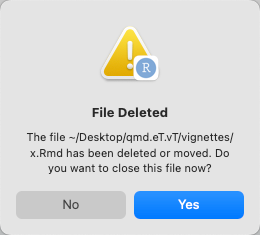Introduction
Saving your data and analyses into an R package helps to create
reproducible research. Someone who wants to reproduce your work can load
a package to have access to your data and your paper(s).
rUM can help you by creating a project
that has all the files/directories needed for an R package including a
vignette folder that contains the outline of a paper.
How do I make a package project?
All you need to do is add vignette = TRUE when you use
the make_project() function. Once the project is created,
run the run_me.R file. For example type:
-
rUM::make_project("~/Desktop/my.example", "R", example = TRUE, vignette = TRUE). This creates a new project with all the files for a package in the current directory. The vignette includes an example table and figure and all the R Markdown syntax for adding hyperlinks to the table and figures. - After the new project is open, run the
RUN_ME_FIRST.R file. The easiest way to do this is by
typing
source("RUN_ME_FIRST.R")into the RStudio IDE console and then pressing enter. If you are working in RStudio it will ask you if it can/should close windows for two deleted files. Say Yes. They are a couple temporary files that we used to set options the project.

- Set the license for your package. REMEMBER: Do share
sensitive data. Talk to the data privacy officer at your
institution/organization before sharing any data. Ask them for advice on
setting a software license. If you are not planning on publicly
sharing your data consider using a proprietary license. For example,
type
usethis::use_proprietary_license("Your Name Goes Here"). To learn more about licences look at the documentation foruse_proprietary_license()by typing:?usethis::use_proprietary_license. You can also learn more at choosealicense.com or here but talk to the legal counsel at your institution/organization before making a decision.
Can I write my vignette with Quarto?
Yes! When you install rUM we make sure
you have a modern version of the R quarto package but we do
not install the most modern copy of the Quarto language itself (which
lives outside of R). You can make sure that your version of Quarto is
modern enough by running quarto::quarto_version(). If your
version is not 1.4.549 or higher, install the latest version of Quarto
directly from here.